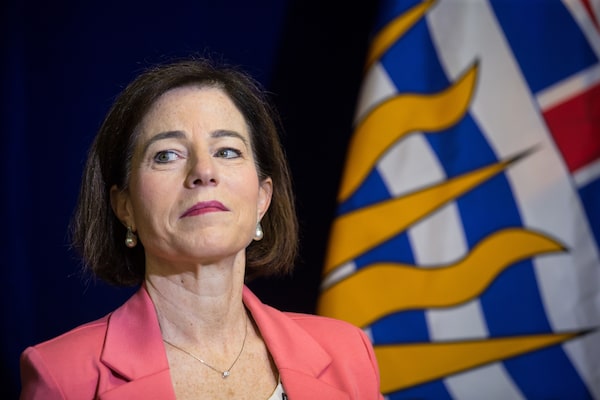
Municipal Affairs and Housing Minister Selina Robinson listens during a housing announcement in Coquitlam, B.C., on April 13, 2018.DARRYL DYCK/The Canadian Press
A grey area in B.C.’s new campaign-finance law that appears to allow civic parties to continue accepting contributions from corporate and union donors so long as the money wasn’t used for campaign expenses will be amended, says the province’s communities minister.
“We promised to get big money out of elections and we’re going to do that,” Selina Robinson says. “I’ve directed staff to fix it.”
The NDP government passed a law last October that prohibited donations from corporations or unions, limits individual contributions to $1,200, and placed a cap on election spending. Many of the restrictions mirrored similar rules introduced for provincial parties.
But The Globe and Mail reported earlier this week that one of Vancouver’s main civic political parties, the Non-Partisan Association, planned to raise money for operations in any way it could, including from corporations. Elections BC confirmed operations expenses are not covered by the new law.
Ms. Robinson said she believed it was very clear that the province’s new rules covered everything done by municipal candidates or political parties, whether it was campaigning or “operating” an elector organization.
“I was disappointed that there’s a party choosing to have a different interpretation,” Ms. Robinson said.
Civic politicians and citizen groups had expressed concern for years about the unregulated spending in civic elections.
The two major parties competing in the 2014 Vancouver election – Vision Vancouver and the Non-Partisan Association – raised and spent $6-million between them. People working in the development industry have said the NPA has been asking for donations.
The other parties, including Vision Vancouver, the Green Party, OneCity, and the Coalition of Progressive Electors, have either said they would not raise money that way, because they think it violates the spirit, if not the letter, of the new law, or their party rules already prohibited those kinds of donations.
Vancouver’s next municipal election, scheduled for Oct. 20, could dramatically reshape the city’s political structures. The current mayor, Gregor Robertson of the left-leaning Vision Vancouver, is not running again and no high-profile candidates have emerged yet to replace him. At the same time, a crowded field on the left side of the spectrum could have a major impact on the races for council seats.
Political observers are divided on whether the province’s new campaign-finance rules are stringent enough.
University of British Columbia political-science professor Max Cameron said he believes the law’s grey area, which allowed parties to raise money for operating expenses with no limits, is a problem.
“That’s quite a significant loophole,” he said.
“If a party gets money for operating expenses, then that releases other money to be spent on the campaign,” he said. “A politician will be as grateful for that money as for campaign money. That doesn’t really get the money out of politics.”
However, Richard Johnston, another UBC political-science professor, says the issue is a “tempest in a teapot” that wouldn’t really affect the major problems of election finance.
Meanwhile, Ms. Robinson insisted that the NDP’s new rules on campaign finance related to third parties do not need any changes, even though some in civic politics have raised concerns that a lot of the money that previously went to some of the big civic parties will be used by third parties.
”That one’s fine because the expense limit is so clear,” the minister said. Third-party groups or individuals who want to express support for a politician or issue in a civic campaign are limited to spending no more than $150,000 throughout the province, which will have almost 200 separate elections for city and town councils on Oct. 20.
As well, each city or town will have a separate spending limit for third parties that will be based on the community’s population.
Ms. Robinson said, if it turns out there are any problems with that, government will be prepared to change the legislation.
“We’ll be monitoring this first election closely.”
 Frances Bula
Frances Bula